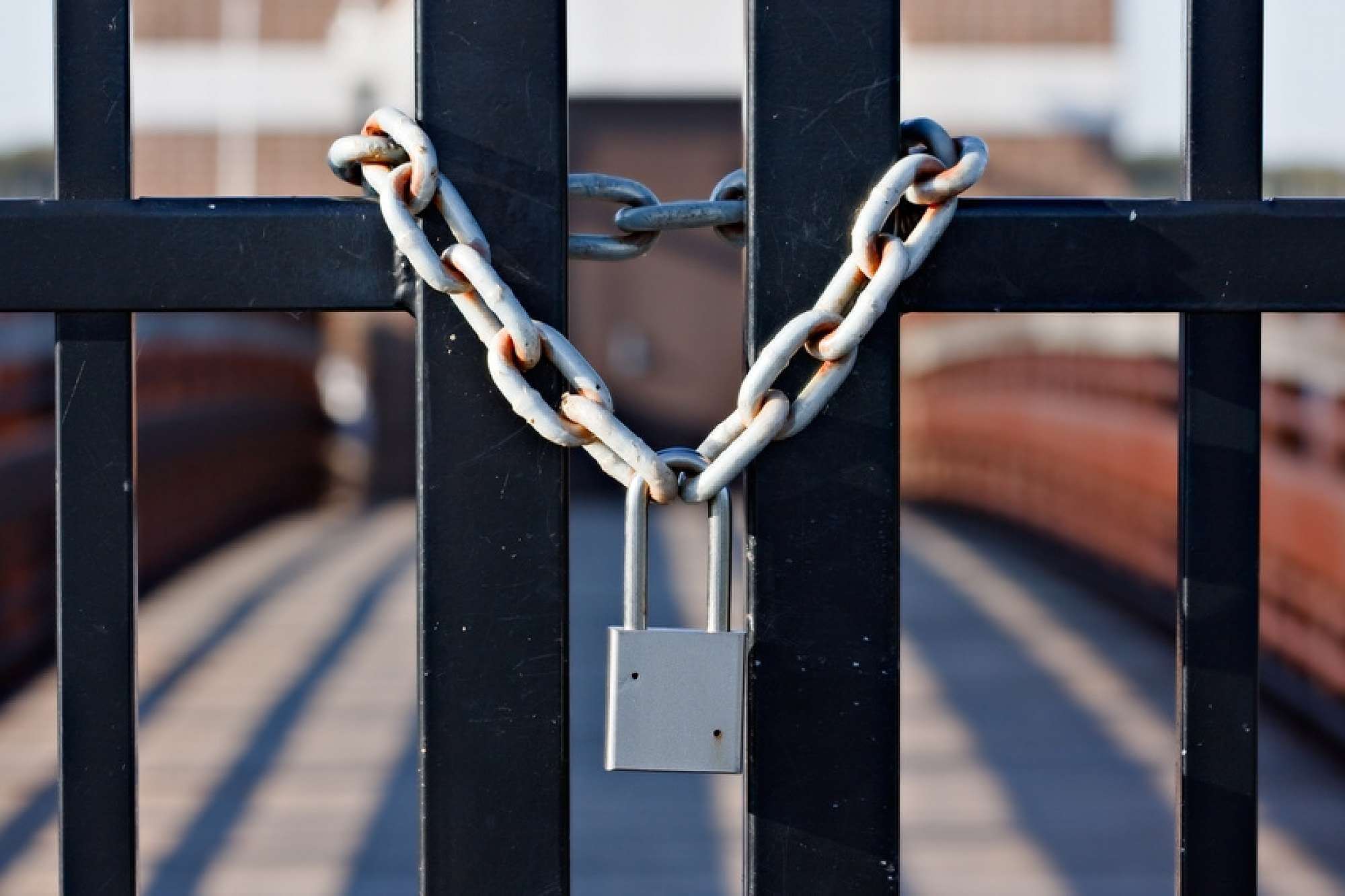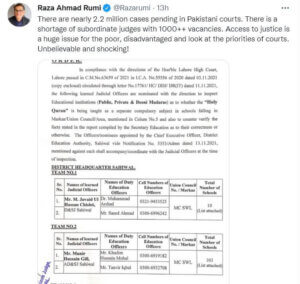
Is the State violating the Fundamental Right to Education? An opinion on sealing of schools in Chiniot
Last week, the education department in Chiniot, an already economically struggling district of Punjab, put a seal to two low-income private schools over their failure to impart the compulsory Holy Quran education as a separate subject. To add injury to the insult to schools who still haven’t quite recovered from the adverse economic effects of this pandemic coupled with preexisting crisis of capacity and resources, the surveillance of this sort is being undertaken across the province on the directions of the Chief Justice of the Lahore High Court. The monitoring teams which have been deputed by district & sessions judges to oversee implementation of Punjab Compulsory Teaching of Holy Quran Act, 2018 in all public and private schools as well as the Deeni Madaris.
The two private schools that have been sealed are Basic International School in Chiniot city and Masoomeen School in the rural Rajoa Sadat village. This action prompted the Private School Owners Association’s president Salim Akhter to rightly question the arbitrary manner in which the schools have been sealed without any prior issuance of a warning or show-cause notice to the said schools.
What has happened in Chiniot is the result of the public interest litigation filed last year by Aneeq Khatana, the High Court Advocate on behalf of Altamash Saeed. The ground presented in the petition was that Article 31 (pertaining to Islamic way of life for Muslims) of the constitution is being violated by the Government of Punjab by not ensuring implementation of the Compulsory Teaching of the Holy Quran Act, 2017 in public as well as private schools. The Lahore High Court, in return, summoned and ordered Punjab Government to ensure the implementation of the Act, with statements recorded from Secretary School Education Department and Chairman PCTB assuring to comply with the directive from academic year commencing in 2021. This further led to formal issuance of the directives by LHC to the district & sessions judge offices to constitute monitoring teams of their officers to visit public, private schools and the deeni madaris at union council level to check their compliance.
This may be followed by sealing of many other schools in the similar fashion. While many may be hailing such overzealous actions by the judiciary and the government, the crucial issue of education depravity–especially under current circumstances where this sector has suffered major blows to its existence –must also be highlighted in all its social development, political and moral contexts. It cannot be left without discussing how certain policies of the state itself are damaging the cause of making education a possibility for millions of deprived children.
Why must Chiniot become Breaking News?
We must take a glance at the education statistics of this district alone as per the government’s own widely referenced PSLM survey for 2019-2020. For this district alone, the numbers aren’t promising. There are 28% children who remain out of school. Primary school net-enrollment rate at 68% has seen no improvement since 2014-15, whereas the literacy rate stands at 45% for the population aged 15 years and above. The population that ever attended school, primary or above, stands at mere 43%. The crisis of children not going to schools anymore can further be seen in only 3% increase in net-enrollments for middle schoolers and 1% increase for matric students since 2014-15. Under the circumstances where out of school ratio of children is high and net enrollment ratio is lower for children aged 5-16 years, how is closing down the schools going to help?
Is the Violation of Article 31 greater than the Violation of Article 25-A?
Article 25-A was added to the fundamental rights chapter of the constitution in 2010. It reads:
“The State shall provide free and compulsory education to all children of the age of five to sixteen years in such manner as may be determined by law.”
The term, free and compulsory education must be understood in its universal spirit in human rights framework. Late Katrina Tomasevski, also former Special Rapporteur on the Right to Education at the UNHCR, wrote in her book Education Denied: Costs and Remedies that the governments are obliged under international human rights law to become the last investor in education when the intake capacity of a school is below the number of the children. The governments are to ensure access, not deny it, because education for children is a public responsibility.
Even though a decade has passed since this already late addition to fundamental rights chapter in the constitution of Pakistan, the rules of business to make it an implementable right have not been developed yet by respective National and Provincial Assemblies, with an exception of Sindh. The dedication and the efficiency for RTE (right to education) that should have been a priority concern for the legislators and the executive is marred by a sheer lack of sincerity. What is most troubling is that RTE is being conflated with the aspirations laid down under the article 31 of the constitution, which belongs to the Principles of Policy chapter. Unlike a fundamental right, a principle of policy is not enforceable by a court of law.
However, it is bewildering that people are more concerned about making Principles of Policy mandatory while completely ignoring Fundamental Rights. Article 31 is a policy aspiration, but punitive measures against schools by sealing them (by judiciary itself) and thereby denying access to so many children enrolled there brings to question how serious our State Machinery is in making education a fundamental right! Opening and running a school can be met with capacity issues, but to punish a school for failing to meet certain policy mandate in a country where education is an emergency issue is preposterous.
Why mustn’t also Article 37 (b), which calls for removing illiteracy and compulsory secondary education within minimum possible time, carry the same weight as Article 31 by the public interest litigators? What are our national priorities here?
It appears as if the state wishes to keep its affairs perpetually confused in the myriad of legal complexities whenever legislative enactments translate into policies. Evidence is enough to also point towards state’s incapacity to apply its acumen in ensuring that fundamental rights are safeguarded from violation and resultant contradictions caused by implementation of certain policies.
Has the Judiciary taken up the role of the Executive?
Raza Rumi, a renowned journalist raises relevant question over the priorities and preferences of the courts in Pakistan. He asks in his tweet:
“There are nearly 2.2 million cases pending in Pakistani courts. There is a shortage of subordinate judges with 1000++ vacancies. Access to justice is a huge issue for the poor, disadvantaged and look at the priorities of courts. Unbelievable and shocking!”

It doesn’t make sense that its members are engaged in surveillance and monitoring of schools while their actual work remains pending in a courtroom. This current deputed roles of the judges will not just affect RTE, but also the access to justice. Surveillance and monitoring of schools and the discretions to be used to make a school comply to a policy should be prerogative of the Education Administrators alone.
Can Punitive Actions against schools rescue our Education System?
Provisions for enabling Article 31 could have been meaningfully linked with the state facilitating to enhance the capacities of the poorly resourced schools, knowing that education gets a nominal share from government spending. The actions undertaken by the education administrations are punitive and insulting to the cause of making education available to all children. Such steps are repelling and discouraging to whatever little investors we are left with in our private education sector, which at present cater to over 40% of children going to formal schools.
A child may be able to survive without the compulsory teaching of religion, but not when he/she is unable to acquire the necessary competencies in basic literacy, comprehension, and arithmetic. Acquiring core academic competencies becomes a matter of human survival in tough economic conditions and denying our children this as a consequence of ill-planned policies is perhaps one of the worst forms of unintended tyranny against them. The school investor will conveniently opt out if they frequently keep getting punished or insulted over capacity issues. It seems that the state doesn’t realize that the ultimate losers will be the children who will find another closed door to their school.
Issuing threats to school is not happening unprecedently. Recently, the school education department of Punjab issued notices to private schools warning them of “consequences”, (as in revocation of licenses) if they did not adhere to the Single National Curriculum. This is carrying damaging implications for learning environments at schools which are forced to bear the brunt of poor quality of textbooks that have been published in extreme haste, and with serious errors, this year. Religion is being excessively used as a cover to hide many holes in our system, and it is major public distraction aimed at keeping the conversations at bay from making the Right to Education a possibility. Pakistan needs to appropriate more budget and resources towards it if it is serious enough in securing its future. There is no other way.
The education statistics across Pakistan are there screaming for attention, yet these numbers fall on deaf ears when decisions are being made for mere political point scoring. The problem gets further twisted when a religious color is given to it with a sole intent of shutting down any opportunity for further arguments and scrutiny even if they’re being put forth on merit. This is the misery that keeps our education crisis in a vicious cycle. There has to be a way out with more sensible approach to policy making. A good foresight with respect to education and the understanding of the potential implications of the laws and policies holds the answer to carefully navigate the cause of education through the religious, legal and political storms that keep threatening it.




2 Comments
The news of closing private schools because of not teaching the Quran will be sold like hot cake. This hybrid regime has learnt one thing and that is the use of religion and covering up every fallacy with religious card.